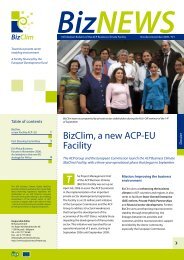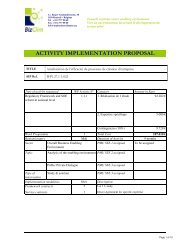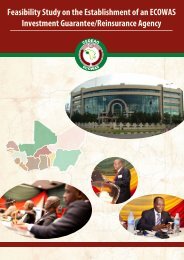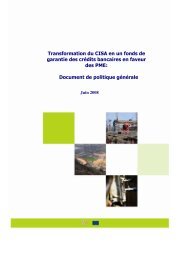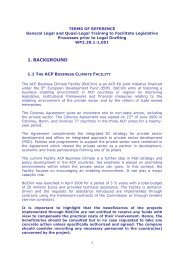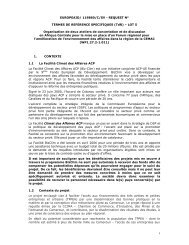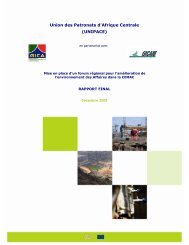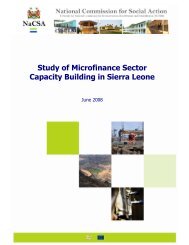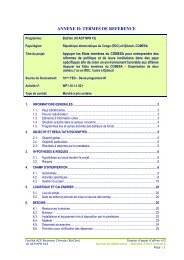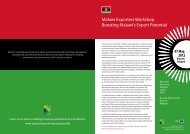(PPP) for Swaziland - ACP Business Climate
(PPP) for Swaziland - ACP Business Climate
(PPP) for Swaziland - ACP Business Climate
Create successful ePaper yourself
Turn your PDF publications into a flip-book with our unique Google optimized e-Paper software.
Closure of the training<br />
The workshop was closed by Titus Khumalo, Under<br />
Secretary of the Ministry of Commerce, Industry and<br />
Trade. He was convinced that the <strong>PPP</strong> route will leverage<br />
government’s resources to effectively and efficiently<br />
achieve the goal of infrastructure development<br />
and provision of services.<br />
Throughout the workshop there was commitment<br />
from senior policy makers and would-be <strong>PPP</strong> managers<br />
together with those who represent private sector<br />
investment interests, and who are or will be directly<br />
involved in structuring and advising on <strong>PPP</strong> infrastructure<br />
projects.<br />
The workshop has been crucial in overcoming existing<br />
‘gaps’ in institutionalising <strong>PPP</strong>s. The workshop <strong>for</strong>um<br />
and the group sessions have helped to pragmatically<br />
assess <strong>Swaziland</strong>’s situation and to identify those priority<br />
actions that will improve its readiness <strong>for</strong> <strong>PPP</strong>s. The<br />
<strong>PPP</strong> Policy will soon be submitted to Cabinet, its finalisation<br />
and promulgation is of paramount importance<br />
to guide <strong>Swaziland</strong>’s <strong>PPP</strong> administration. All workshop<br />
participants are now asked to take further reflections<br />
on the subject of <strong>PPP</strong>s and possibly to identify a list of<br />
potential projects within their setting which can need<br />
joint partnership between the public and the private<br />
sectors.<br />
The workshop has been successful in creating awareness<br />
of the <strong>PPP</strong> process and created a basic understanding<br />
of the process and critical dimensions of how to<br />
identify, initiate and implement <strong>PPP</strong> projects. Many of<br />
the participants had only a very rough idea of what <strong>PPP</strong><br />
means, not always based on real facts.<br />
“[During the workshop] I learnt that <strong>PPP</strong>s are<br />
different from outsourcing.”<br />
Constance Mazina, Acting Director Health Sector,<br />
Municipal Council Mbabane<br />
One of the reasons <strong>for</strong> the success was the composition<br />
of the workshop group. The participants had very different<br />
backgrounds and could not only learn from each<br />
other but also do networking <strong>for</strong> future <strong>PPP</strong> projects.<br />
The private and the public sector could establish the<br />
necessary contacts in the other sector.<br />
I have been able “to identify organisations which<br />
could provide technical support <strong>for</strong> initiating <strong>PPP</strong>s<br />
in <strong>Swaziland</strong>”<br />
Sibusiso Mbingo, Managing Director Micro Projects<br />
But also within the public sector it is useful to get to<br />
know colleagues from other ministries and institutions.<br />
“Group discussions led to a clear understanding<br />
of the <strong>PPP</strong> projects, how to handle and monitor<br />
them. I have met a lot of representatives of different<br />
departments and so was able to learn about<br />
their roles in <strong>PPP</strong>.”<br />
Sincedile Dlamini, Principal Procurement Officer in the Ministry of<br />
Health<br />
These bonds will remain and facilitate the implementation<br />
of different kind of projects even after the end of<br />
the workshop.<br />
Also the working method <strong>for</strong>ced the participants to<br />
21




